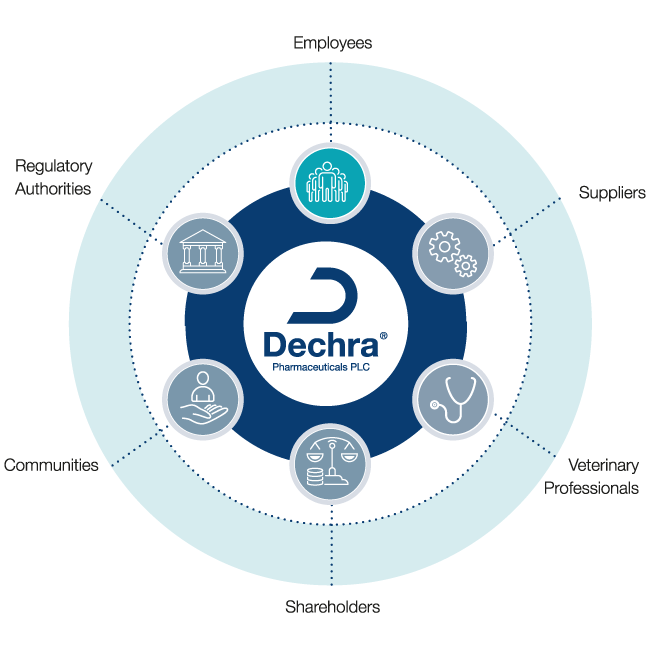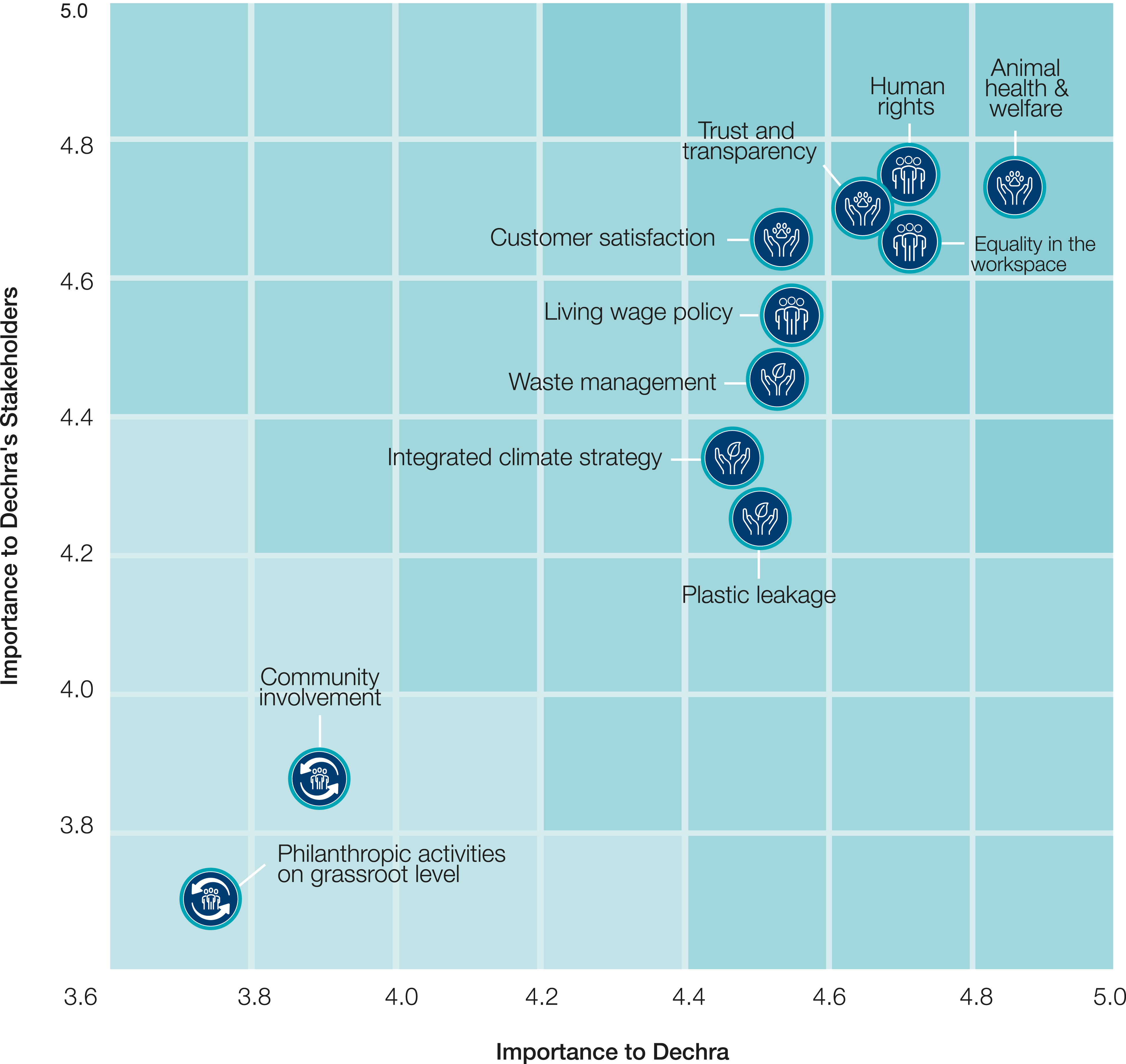

Sustainability Report 2022
Download PDFWe have identified six key internal and external stakeholder groups that we believe are important to engage with regularly to continue to make Dechra successful: people, veterinary professionals, shareholders, suppliers, communities and regulatory authorities.

Internal Stakeholder
External Stakeholder
People: Our employees are our greatest asset and we aim to make Dechra a great and safe place to work by attracting, retaining and developing talent. We employ 2,163 people in 25 countries in a wide range of working environments so multi-channel communication is key to successful engagement. To achieve this, we host a Group intranet site, perform regular site visits by Senior Management, hold Town Hall meetings, engagement surveys, employee meetings with the Employee Engagement Designated Non-Executive Director, Lisa Bright, performance reviews, employee development and training and direct communication to all employees from the Chief Executive Officer.
Customers: Our customers are veterinary professionals operating in veterinary practices and major farming units. We engage with veterinary professionals to improve animal health and welfare. We provide high levels of technical support and educational training to develop a strong relationship with, and be recognised as an important partner to, veterinary professionals. Key engagement platforms are provided through the use of our innovative and effective products supplemented by daily engagement with our people, utilisation of the Dechra Academy, our award winning online educational system, lunch and learns and technical support helpline.
Shareholders: Shareholder engagement is key to instilling trust and confidence, whilst also facilitating informed investment decisions. Understanding financial performance, strategic delivery and ESG performance form the basis of our engagement with this stakeholder group. Engagement is provided through the Annual Report and RNS announcements, the Annual General Meeting, investor presentations, corporate website and one-on-one meetings.
Suppliers: We aim to trade with honesty and integrity, and to source sustainable, ethically produced, quality raw materials and finished products. We provide fair trading terms and seek to establish long term trading relationships. We engage regularly through one-to-one meetings, perform quality audits, due diligence, ABC training and via our third party code of conduct.
Communities: We believe it is important to give something back to the communities in which we operate. Engagement includes support and participation in community activities, projects and initiatives, financial and product donations and through the provision of development and educational opportunities to local people through employment.
Regulatory Authorities: It is vital to our business that our products meet the highest possible safety and quality standards. Regulatory training is provided for employees and we engage with regulators via manufacturing facility inspections, market authorisation applications and product safety update reports (PSURs).
A thorough approach to defining our Sustainability strategy
In spring 2022, we conducted a materiality assessment to identify the most important sustainability topics to us as a business and to our stakeholders.
The results of the assessment will shape our sustainability strategy, drive our engagement with stakeholders and help us prioritise areas of focus, target setting and guide our reporting and disclosure moving forward.
Our Approach to Materiality Assessment
Ahead of performing the assessment, and in order to identify material sustainability topics, we considered those that we were already working towards as part of our Making a Difference plan. We also performed additional desk based research from leading sustainability reporting frameworks and peers on those topics that are deemed to be important within our industry as well as obtaining feedback from investors and other stakeholders, including key management, on thematic sustainability topics. In conducting the assessment we surveyed 276 people from our six stakeholder groups and asked them to rank 31 sustainability topics in order of importance.
Our Materiality Assessment Findings
Key topics identified as part of the assessment such as animal health and wellbeing, human rights and equality in the workplace are fully aligned to our Making a Difference plan and will continue to form the basis of our engagement with stakeholders. Our findings showed that there is increasing demand from stakeholders to understand our environmental strategy, including our approach to climate change, responsible consumption and production and biodiversity. Our community related philanthropic actions are established and appear to be well understood.
Outlook
Our focus will remain on those topics deemed to be of most importance to our stakeholders. We will continue to engage with stakeholders and embed sustainability into the DNA of our business, but acknowledge that we will need to remain agile and adapt to new demands, legislation, changing trends and technological advances, all of which will result in the evolution of our Making a Difference plan over time.


Our Materiality Assessment identified a total
of 11 topics across our Sustainability Pillars

We have conducted a sustainability materiality assessment for the first time this year to identify the most important sustainability topics to us as a business and to our stakeholders.
The results of this assessment have helped shape our sustainability strategy, drive our engagement with stakeholders and prioritise areas of focus and target setting whilst guiding our reporting and disclosure in this area moving forward. For further information please read our Sustainability Report.
Section
Our Business
Our Community
Our Environment
Our People
| Pillar | Sustainability Topic | Focus Area | Objective |
Our Business | Animal Health and Welfare | Ethical and sustainable products | Develop and promote products to sustainably improve animal health and welfare |
| Customer Satisfaction | Supporting veterinary professionals | Maintain and improve the knowledge and skills of veterinarians | |
| Trust and Transparency | Ethics | Act with honesty and integrity | |
Our Environment | Integrated Climate Strategy | Emissions, Land & Water and Biodiversity | Reduce GHG emissions and waste to landfill, use water responsibly and protect diversity |
| Waste Management | Circularity | Recover, reduce, recycle, reuse | |
| Plastic leakage | Responsible Sourcing | Implement sustainable packaging and decrease plastic usage | |
Our People | Wage Policy | Fair Employment Practices | Comply with national legal requirements regarding wages and working hours |
| Human Rights | Safe Working Practices | Reinforce health and safety practices, with a culture of zero harm | |
| Equality in the Workspace | Fair Employment Practices | Eliminate the gender pay gap | |
Our Community | Community Involvement | Community Activities | The donation of time, products and skills to local charities |
| Philanthropic Activities | Community Donations | Establish Regional Giving Committees to allow our people to make a difference locally |
Sustainability Metrics and Targets
In defining our Sustainability strategy, we have developed a total of 11 key metrics to help us track year on year progress. Reporting against these metrics allows us to remain transparent in how we are delivering against the commitments we have made and ensure we focus our efforts in the right areas.
| Pillar | Target | Performance in the 2022 financial year |
Our Business | Invest 5% to 6% of revenue on product development per annum | 4.8% |
| Provide 100,000 CPD hours per annum | 130k hours | |
| Perform a value chain sustainability assessment by 30 June 2030 | Project on track | |
Our Environment | Achieve Net Zero carbon emissions by 2050 | 10% reduction in intensity ratio |
| Zero to landfill by 30 June 2025 | 7.3% | |
| 100% FSC paper by 30 June 2023 and review full product range by 30 June 2025 | Project on track | |
Our People | Become a Living Wage Employer, or equivalent, by 30 June 2022 | Achieved |
| Zero lost time accidents (LTAs) | 12 | |
| One day of training per employee per annum | 17 hours | |
Our Community | Dedicate 100,000 community hours by 30 June 2030 | 4,390 in FY22 (nil in FY21) |
| Donate £5 million in cash or products by 30 June 2030 | £346k in FY22 £728k cumulative |
We have made good progress in the 2022 financial year, having already delivered against a number of important objectives, even though our journey is still in its infancy.
We believe the long term targets we have set are credible, appropriate for our business and sufficiently ambitious. However, we remain committed to reviewing them on an ongoing basis, and evolving our strategy where necessary to meet the changing needs and expectations of all our stakeholders.
In the 2023 financial year, we intend to make further progress, in particular validating long term Science Based Targets relating to Scope 1, 2 and 3 carbon emissions.